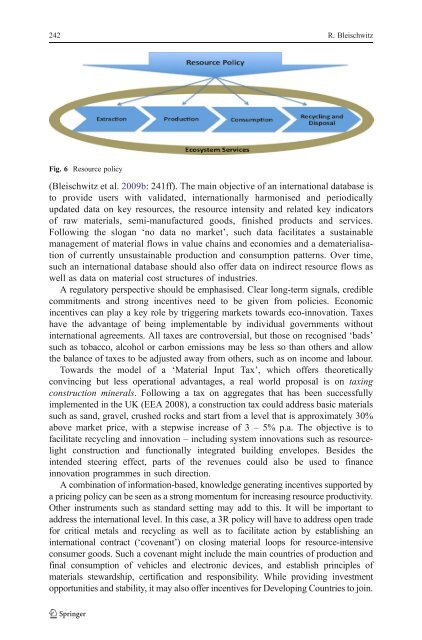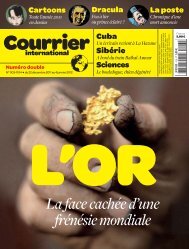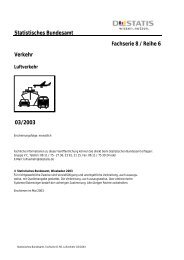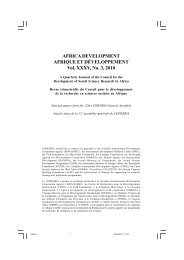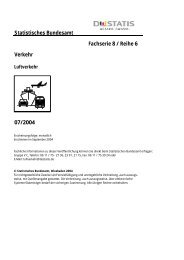The international economics of resources and resource ... - Index of
The international economics of resources and resource ... - Index of
The international economics of resources and resource ... - Index of
Create successful ePaper yourself
Turn your PDF publications into a flip-book with our unique Google optimized e-Paper software.
242 R. Bleischwitz<br />
Fig. 6 Resource policy<br />
(Bleischwitz et al. 2009b: 241ff). <strong>The</strong> main objective <strong>of</strong> an <strong>international</strong> database is<br />
to provide users with validated, <strong>international</strong>ly harmonised <strong>and</strong> periodically<br />
updated data on key <strong><strong>resource</strong>s</strong>, the <strong>resource</strong> intensity <strong>and</strong> related key indicators<br />
<strong>of</strong> raw materials, semi-manufactured goods, finished products <strong>and</strong> services.<br />
Following the slogan ‘no data no market’, such data facilitates a sustainable<br />
management <strong>of</strong> material flows in value chains <strong>and</strong> economies <strong>and</strong> a dematerialisation<br />
<strong>of</strong> currently unsustainable production <strong>and</strong> consumption patterns. Over time,<br />
such an <strong>international</strong> database should also <strong>of</strong>fer data on indirect <strong>resource</strong> flows as<br />
well as data on material cost structures <strong>of</strong> industries.<br />
A regulatory perspective should be emphasised. Clear long-term signals, credible<br />
commitments <strong>and</strong> strong incentives need to be given from policies. Economic<br />
incentives can play a key role by triggering markets towards eco-innovation. Taxes<br />
have the advantage <strong>of</strong> being implementable by individual governments without<br />
<strong>international</strong> agreements. All taxes are controversial, but those on recognised ‘bads’<br />
such as tobacco, alcohol or carbon emissions may be less so than others <strong>and</strong> allow<br />
the balance <strong>of</strong> taxes to be adjusted away from others, such as on income <strong>and</strong> labour.<br />
Towards the model <strong>of</strong> a ‘Material Input Tax’, which <strong>of</strong>fers theoretically<br />
convincing but less operational advantages, a real world proposal is on taxing<br />
construction minerals. Following a tax on aggregates that has been successfully<br />
implemented in the UK (EEA 2008), a construction tax could address basic materials<br />
such as s<strong>and</strong>, gravel, crushed rocks <strong>and</strong> start from a level that is approximately 30%<br />
above market price, with a stepwise increase <strong>of</strong> 3 – 5% p.a. <strong>The</strong> objective is to<br />
facilitate recycling <strong>and</strong> innovation – including system innovations such as <strong>resource</strong>light<br />
construction <strong>and</strong> functionally integrated building envelopes. Besides the<br />
intended steering effect, parts <strong>of</strong> the revenues could also be used to finance<br />
innovation programmes in such direction.<br />
A combination <strong>of</strong> information-based, knowledge generating incentives supported by<br />
a pricing policy can be seen as a strong momentum for increasing <strong>resource</strong> productivity.<br />
Other instruments such as st<strong>and</strong>ard setting may add to this. It will be important to<br />
address the <strong>international</strong> level. In this case, a 3R policy will have to address open trade<br />
for critical metals <strong>and</strong> recycling as well as to facilitate action by establishing an<br />
<strong>international</strong> contract (‘covenant’) on closing material loops for <strong>resource</strong>-intensive<br />
consumer goods. Such a covenant might include the main countries <strong>of</strong> production <strong>and</strong><br />
final consumption <strong>of</strong> vehicles <strong>and</strong> electronic devices, <strong>and</strong> establish principles <strong>of</strong><br />
materials stewardship, certification <strong>and</strong> responsibility. While providing investment<br />
opportunities <strong>and</strong> stability, it may also <strong>of</strong>fer incentives for Developing Countries to join.


